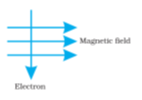Class 10 Science
Magnetic Effects of Electric Current


Question 1:
The magnetic field lines originate from
(a) south Pole
(b) north Pole
(c) centre of Magnet
(d) none of these
Question 2:
A positively-charged particle (alpha-particle) projected towards west is deflected towards north by a magnetic field. The direction of magnetic field is
(a) towards south
(b) towards east
(c) downward
(d) upward
Question 3:
Which device is used to convert electrical energy into mechanical energy?
(a) Galvanometer
(b) Potentiometer
(c) Electric motor
(d) Electric generator
Question 4:
An electron enters a magnetic field at right angles to it, as shown in fig. The direction of force acting on the electron will be

(a) to the right.
(b) to the left.
(c) out of the page.
(d) into the page.
Question 5:
The split ring in motor is known as __________.
(a) armature
(b) rotor
(c) commutator
(d) core
Question 6:
A rectangular coil of copper wires is rotated in a magnetic field. The direction of the induced current changes once in each
(a) two revolutions
(b) one revolution
(c) half revolution
(d) one-fourth revolution
Question 7:
The magnetic field inside a solenoid is:
(a) zero
(b) decreases along the axis
(c) increases along the axis
(d) uniform
Question 8:
Which is not true?
(a) Poles of magnet are not exactly at ends but are slightly inside
(b) A magnetic pole cannot be isolated
(c) Magnetism is weakest at poles
(d) Lode stone is a natural magnet
Question 9:
Unit of electric power may also be expressed as
(a) Watt second
(b) Ampere hour
(c) Volt ampere
(d) Kilowatt hour
Question 10:
The potential difference between a live wire and a neutral wire is __________.
(a) 100 V
(b) 280 V
(c) 220 V
(d) 0 V
Question 11:
What is fuse?
Question 12:
What is electric generator? Write down its principle of working.
Question 13:
What is difference between AC and DC? Write down advantage of AC over DC?
Question 14:
List the properties of magnetic field lines.
Question 15:
Explain any two situations that can cause electrical hazards in domestic circuits.
Question 16:
Write the difference between electric motor and electric generator?
Question 17:
What is meant by solenoid? How does a current carrying solenoid behave? Give its main use.
Question 18:
Explain the use of magnetism in medicine?
Question 19:
What is an electromagnet?
Question 20:
Mention the source which produces of direct current and alternating current.
**********
In summary, problem-solving after learning a theoretical concept on CBSE Magnetic Effects of Electric Current Class 10 Science is an essential part of the learning process. It enhances your understanding, critical thinking abilities, and retention of knowledge. Moreover, it equips you with valuable skills that are applicable in academic, personal, and professional contexts.
You must have heard of the phrase “Practice makes a man perfect”. Well, not just a man, practice indeed enhances perfection of every individual.
Practicing questions plays a pivotal role in achieving excellence in exams. Just as the adage goes, "Practice makes perfect," dedicating time to solve a diverse range of exam-related questions yields manifold benefits. Firstly, practicing questions allows students to familiarize themselves with the exam format and types of problems they might encounter. This familiarity instills confidence, reducing anxiety and improving performance on the actual exam day. Secondly, continuous practice sharpens problem-solving skills and enhances critical thinking, enabling students to approach complex problems with clarity and efficiency. Thirdly, it aids in identifying weak areas, allowing students to focus their efforts on improving specific topics. Moreover, practice aids in memory retention, as active engagement with the material reinforces learning. Regular practice also hones time management skills, ensuring that students can allocate appropriate time to each question during the exam. Overall, practicing questions not only boosts exam performance but also instills a deeper understanding of the subject matter, fostering a holistic and effective learning experience.
All About Daily Practice Problems on Class 10 Science Magnetic Effects of Electric Current NCERT Chapter 12
Our Daily Practice Problems (DPPs) offer a diverse range of question types, including Multiple Choice Questions (MCQs) as well as short and long answer types. These questions are categorized into Easy, Moderate, and Difficult levels, allowing students to gradually progress and challenge themselves accordingly. Additionally, comprehensive solutions are provided for each question, available for download in PDF format - Download pdf solutions as well as Download pdf Questions. This approach fosters a holistic learning experience, catering to different learning styles, promoting self-assessment, and improving problem-solving skills. With our well-structured DPPs, students can excel in exams while gaining a deeper understanding of the subject matter. Hope you found the content on Class 10 Science Magnetic Effects of Electric Current NCERT Chapter 12 useful.
Last but not least, to get the best hold on Class 10 Science Magnetic Effects of Electric Current NCERT Chapter 12, do not forget to check out: